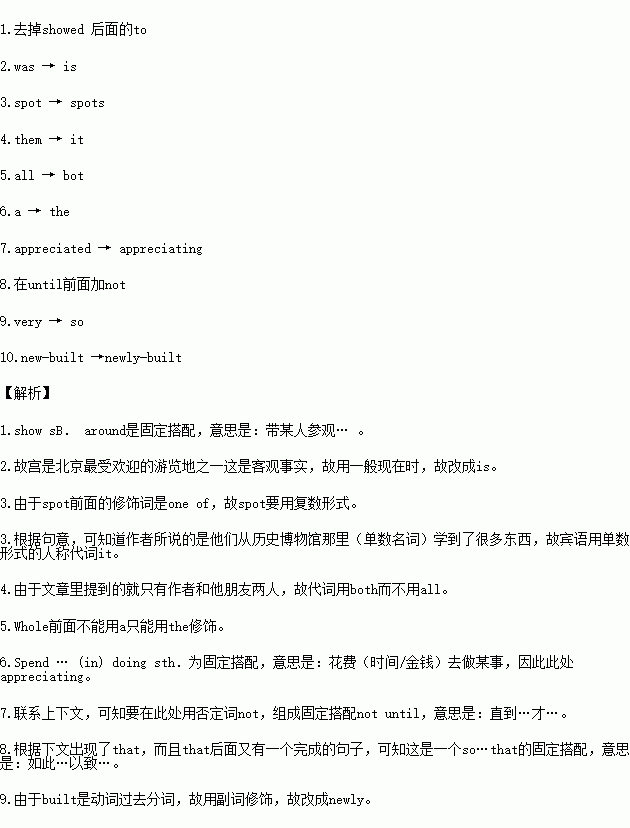ĢāÄæÄŚČŻ
¼Ł¶ØÓ¢ÓļæĪÉĻĄĻŹ¦ŅŖĒóĶ¬×ĄÖ®¼ä½»»»ŠŽøÄ×÷ĪÄ£¬ ĒėÄ抎øÄÄćĶ¬×ĄŠ“µÄŅŌĻĀ×÷ĪÄ”£ĪÄÖŠ¹²ÓŠ10“¦ÓļŃŌ“ķĪó£¬Ćæ¾äÖŠ×ī¶ąÓŠĮ½“¦”£Ć擦“ķĪó½öÉę¼°Ņ»øöµ„“ŹµÄŌö¼Ó”¢É¾³ż»ņŠŽøÄ”£
Ōö¼Ó: ŌŚČ±“Ź“¦¼ÓŅ»øöĀ©×Ö·ūŗÅ(”Ä)£¬²¢ŌŚĘäĻĀĆꊓ³öøĆ¼ÓµÄ“Ź”£
ɾ³ż: °Ń¶ąÓąµÄ“ŹÓĆŠ±Ļß( \ )»®µō”£
ŠŽøÄ: ŌŚ“ķ“ŹĻĀ»®Ņ»ŗįĻߣ¬²¢ŌŚøĆ“ŹĻĀĆꊓ³öŠŽøÄŗóµÄ“Ź”£
×¢Ņā:1.Ć擦“ķĪó¼°Ę䊎øľł½öĻŽŅ»“Ź£»
2.Ö»ŌŹŠķŠŽøÄ10“¦£¬¶ąÕß(“ÓµŚ11“¦Ęš)²»¼Ę·Ö”£
Yesterday I showed to my friend Peter around Beijing city£®We started off at 8:00 a.m£®First we went to the Forbidden City, which was one of the most popular tourist spot in Beijing£®Then we visited the History Museum£®We observed a lot of valuable things in them and we learned a lot about Chinese history£®After a quick meal, we wentto Beihai Park£®Upon arrival, we were all struck by its beautiful scenes£®We spent a whole afternoon appreciated the wonder£®It was until 18:00 p£®m£®that we went back.
We did have a wonderful time£®Peter was very pleased with my arrangement that he
invited me to a new-built western restaurant to have a big meal.


 y mean .
y mean .